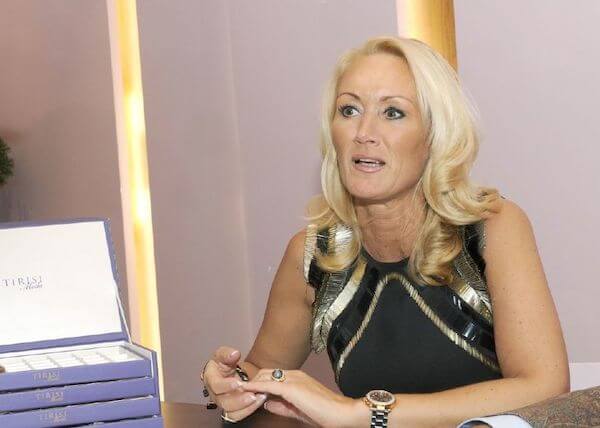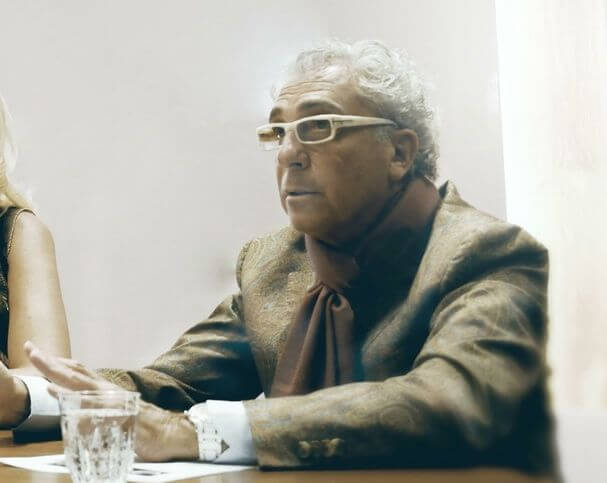Interview with Natascha Zuchouwski, Founder of Trisi and Julian Rotstein, Founder of IBB Amsterdam, The Netherlands
At Baselworld the largest jewelry and watches fair in the world, the glamour of the stands representing luxury brands from all over the world is near to overwhelming. But when you walk past the stand of Tirisi, a brand launched by luxury conglomerate IBB Amsterdam, an unusual sight immediately catches one’s eye: In the middle of all the artificial light and extravagance stands a tall soft pink blossom tree. Doing things differently is the normal modus operandi for IBB Amsterdam and bringing a tree all the way to Basel to make a statement is but one of the many unusual strategies this firm has applied to grow exponentially over the past decades. IBB Amsterdam retains the rights for Guess Watches distribution in Holland, France, Sweden, Denmark and Ireland. The company did not shy away from launching its own brands amongst which are now Ti Sento Milano, 14K Blush and most recently, Tirisi.
Under the restful atmosphere of the pink blossom tree, we met with Natascha Zuchouwski and Julian Rotstein who tell the tale behind the success of IBB Amsterdam, their family, and the intra-family business model that has led to their success.
[ms-protect-content id=”4069, 4129″]
Embarking on an adventure
In 1993, Julian Rotstein founded IBB Amsterdam with two friends and turned it into what is today a 200-employee luxury conglomerate. “We have always had a strong relationship between the founders. We never had a fight in the 22 years that we have been working together. There’s a total trust between us and running the business has always been very smooth. When you do not fight about money, there is nothing to fight about,” explains Julian while sitting next to his wife Natascha who joined the company 17 years ago.
Julian’s journey started in his home country South Africa. “While other children dreamt to be firemen or astronauts, I wanted to become a diamond trader from a young age. I left South Africa for Amsterdam and started from scratch with no money in my pocket and only a head full of dreams and ambitions. I became a diamond merchant and worked in London and Hong Kong where I became very successful,” he narrates.
Dealing solely in raw diamonds soon was not enough to satisfy Rotstein’s creative nature and the urge to be an entrepreneur got the better of him. “In 1993, I decided it was time to go into the jewelry and watch business. We founded IBB Amsterdam and became the distributors for the GUESS watch line. Today, we are their biggest distributors for the GUESS watch line. Today, we are their biggest distributors and serve five countries with their products,” Julian proudly declares.
When prompted to explain just how they’ve managed to create such a harmonious accord between their many businesses concerns, Natascha and Julian laugh. “Keep it clean. You come into life with nothing and you leave life with only your name. When we leave this life we want people to say that we were honest,” Natascha clarifies.
Once IBB Amsterdam became a very successful distributor for jewelry and watch brands, their ambition drove them to want even more. “In 2009 we knew that we wanted to launch our own brand. This is how Tirisi was born at Baselworld in 2010. We designed the booth, the jewelry, the bags, everything! Basically it is Natascha who does it all though,” states Julian proudly whilst looking at his wife.
The coupling of a team
Natascha is an entrepreneur in her own right. She owned her own jewelry and watch booth and as a result met Julian at a fair. IBB bought Natascha’s business and as a condition of the union requested that she merge with their team. “Natascha joined the company to sell GUESS products door to door over 17 years ago. It is really through her and our partner Tamara’s son’s relentless efforts that we made it this big,” Julian explains. Natascha has worked with the company for nearly two decades and nine years ago wed Julian.
The pair is quick to recognise the strengths that each possesses, qualities which they credit for the company’s continued success. “Tirisi is really Natascha’s baby and how she does it all is beyond me. She is the creative brain behind this. It is like our incubator,” says Julian. “The reason it works between us,” says Natascha, “is that we each have our own domain of expertise.”
While their partnership today appears seamless, Julian makes it clear that they’ve overcome a number of obstacles, which include manoeuvring previously held partnerships as well as the need to eliminate any indication of favouritism between the two. “At Tirisi, Natascha runs her budget like everyone else and at IBB she was trained to become a buyer for jewelry and watches. But we soon discovered her design talent and that is how Tirisi came to pass.”
Family-orientation and intra-family businesses
Julian and Natascha’s partnership is one which has allowed each to thrive as the two clearly leverage one another’s abilities at both work and home. “We have our four children to look after as well.
Even though the eldest is 26 years old and the youngest is 14, there is still a lot to do,” says Julian giving full credit to his wife. “I don’t know how she does it. It is amazing how a woman can do everything at home while giving our brand everything it needs from A to Z.”
Natascha glows with pride at the mention of her children. “They are so involved. The youngest is currently helping out with the website and my daughter is taking a great interest in design,” she shares.
Generally, our office allows family orientation,” Julian opines. “It was not a challenge for us to become a couple later in the game after working together because there are so many couples and family members working together at IBB Amsterdam. For instance one of our partners, Tamara, her son joined us early on. She was initially worried about there being fights but I instead otherwise. I made sure that he would never have to report to her directly and instead he reported to me and it all worked out smoothly,” explains Julian.
“That is how we were able to involve him and create the first multi-generational intra-family business within IBB Amsterdam. Today, Natascha reports to Tamara’s son instead of me so that there is no conflict of interest. So while our collaboration is based on creativity, everything managerial is always overseen by a non-family member.” The success of the IBB working order is made abundantly clear by the steady stream of smiling co-workers who drop in and out of our conversation with Julian and Natascha.
This model of employing people with entrepreneurial spirit, couples and family members alike, has created a vast pool of creativity. Creating these intra-family business dynamics has encouraged each employee to be creative within an environment, which encourages outside the box thinking. “The head designer of Ti Sento, another one of our brands, is the general manager. And we also have siblings as well as parents and children working together,” says Natascha. Everything that a family business fears in terms of complex dynamics, IBB has invited in. “Because they come from different families it works. We have created mini-family businesses within our family business,” Julian says good-humouredly.

Loyalty and ownership
This family orientation has allowed the company to thrive on its employees’ loyalty. “We have created a lot of space around everyone. Everyone has a lot of pressure but a lot of freedom at the same time. We all leave our ego at home and that is how we have created so many opportunities for so many people and this is what made us grow,” declares Julian.
The company’s ownership is still held between Julian and his two co-founders. When we ask whether the children will join the company, Julian explains: “In our company everyone has to start from scratch, there is no crown prince or princess. No one can transfer their shares to anyone else. They have to be bought. There is a sense of extended family in our company because there are so many sub-companies. I don’t know and I don’t care what my shares are worth. I feel like I work for the company, not like I own it,” says humbly.
“Everyone in this company needs one another,” says Natascha. “Our distribution business is still very large and we are adding two brands as we speak. For us it’s imperative to create new distribution channels, to create our own new brands. We are open to new ideas and to developing our own.”
Tharawat Magazine, Issue 22, 2014
[/ms-protect-content]














